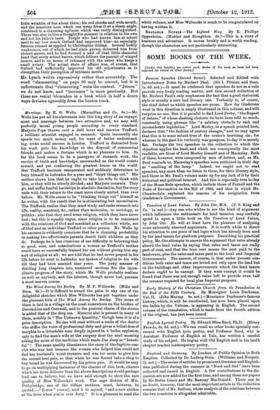SOME BOOKS OF THE WEEK.
[Under this heading we notice such Books of the week as have not been reserved for review in other forms.) Famous Speeches (Second Series). Selected and Edited with Introductory Notes by Herbert Paul. (Sir I. Pitman and Sons. 7s. 6d. net.)—It must be confessed that speeches do not as a rule provide very lively reading matter, and this second collection of Mr. Herbert Paul's only emphasizes the fact that a good rhetorical style is usually a very bad literary one. Verbosity is, of course, the chief defect to which speeches are prone. How far Gladstone went in this direction is amply illustrated in this volume, and will surprise no ono. But it is painful to find Lord Derby, "the Rupert of debate," of whose slashing rhetoric we have been told so much, constantly using phrases like "a salutary obstacle to rash and
legislation." Lord Morley, in a speech printed here, declares that "the fashion of oratory changes," and we may agree that this is to some extent true of the orator's besetting sin ; for whereas in the past his verbosity was pompous, to-day it is merely flat. Perhaps the two speeches in the collection to which this objection applies the least, and which are consequently the most readable, are those of Lord Morley himself and of Macaulay. Both of these, however, were composed by men of letters, and, as Mr. Paul reminds us, Macaulay's speeches were criticized in their day as " smelling of the lamp." Indeed, we ought not to read speeches, any more than we listen to them, for their literary style, and those in Mr. Paul's volume make up for any lack of it by their historical and political interest. And this is especially true to-day of the Home Rule speeches, which include those of Parnell and the Duke of Devonshire on the Bill of 1886, and that in which Mr. Chamberlain explained the reasons of his resignation from Gladstone's Government.










































 Previous page
Previous page